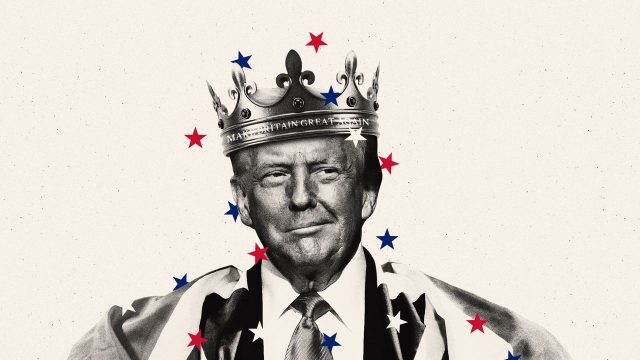
A Reform government would turn Britain into “Trump’s America”, Ed Davey has said, as he tried to tie the policies of Nigel Farage and Donald Trump together in voters’ minds.
“Imagine living in the Trump-inspired country Farage wants us to become,” said the Lib Dem leader in his keynote speech at his party’s conference in Bournemouth. Davey painted “a nightmarish vision”, said the BBC, of the end of the NHS, a countryside destroyed by fracking, lax gun laws, racism, misogyny and “a constant state of chaos”.
Farage duly rubbished those claims but Davey’s warning about the Trumpification of British politics should be taken seriously, said Peter Geoghegan in Prospect: the American president is a “lodestar, the harbinger of a populist revolution that could be emulated on this side of the pond”.
What did the commentators say?
The year is 2029, and Donald Trump “holds two titles”, said Politico’s Paul Dallison: “US President-for-Life and UK prime minister”.
That sentence “would have been firmly in the realm of science fiction even a couple of years ago. But now, it doesn’t sound quite so far-fetched.” After all, the US president, with his British mother, would be eligible for the UK premiership, as former Cabinet minister Jacob Rees-Mogg pointed out on GB News during Trump’s state visit.
For the past decade, “some of Trump’s biggest donors have been secretly funding a clutch of the most influential groups on the right of British politics”, said Prospect’s Geoghegan.
Former Conservative bigwigs Robert Jenrick, Priti Patel and Liz Truss have “all traipsed to Washington” and spoken at the Heritage Foundation, the “hugely influential” think tank behind Project 2025, the “blueprint for a state-eviscerating” second Trump administration.
But few UK politicians are “as close to Trump as Nigel Farage”. He is “plugged into the very top” of the Republican party and has recently claimed Trump “knows” that he will be Britain’s next prime minister. He told the Harry Cole Saves the West YouTube show that Trump’s team saw “similarities in what they’ve done and what we’ve done, and you know what, we speak the same language”.
Farage has “enjoyed a friendship with Trump for almost a decade”, said Dominic Penna in The Telegraph. He joined him on the US presidential campaign trail in 2016 and told his supporters that a Republican victory would be “Brexit plus, plus, plus”.
What next?
Regardless of Trump’s next political endeavour, it’s clear that the tech billionaires who have supported him are already having their own impact on politics abroad.
Palantir founder Peter Thiel and his fellow Silicon Valley “political kingmakers” are heavily influenced by far-right blogger Curtis Yarvin’s “dark enlightenment” ideas, said The Guardian’s Arwa Mahdawi. They believe “super-rich elites should have dictatorial powers” while the “hoi polloi should suck it all up”.
Elon Musk, Tesla boss and Trump’s former “first buddy” is “increasingly taking his political meddling worldwide”, from Canada and Germany to the UK. He “spent January posting about grooming gangs”, then, at the “Unite the Kingdom” rally, called for a “change of government”. Over a video link, he told the crowd, “Violence is coming to you. You either fight back or you die.”
It feels as if Musk is increasingly trying to “destabilise democracies worldwide so he can accumulate more power”, said Mahdawi. It is “not inconceivable” that a tech mogul “could effect regime change in Britain”.
Direction of UK politics reflects influence and funding from across the pond




